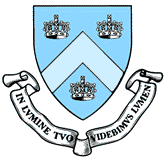PROFESSOR HELFAND'S LETTER TO CC FIRST-YEARS
-----------------------------------------------------------------
Dear Students:
As part of your Columbia experience this year, you will be taking Frontiers of Science, the latest addition to Columbia's Core Curriculum.
Some of Columbia's most distinguished scientists from a variety of scientific disciplines will present the latest discoveries in their fields, and explore the unknowns on the frontiers of our current knowledge to speculate on the discoveries to come in your future. Our goals for the course are straightforward:
1) to demonstrate the dynamic mode of inquiry we call science while enriching your perspective on the universe, and
2) to inculcate some of the habits of mind that inform this rational approach to the world.
Students entering Columbia come from a rich variety of backgrounds and, particularly as far as their exposure to science is concerned, arrive with a wide range of experiences (from the good to the bad to the ugly).
In order to provide a self-assessment of your experience and to illustrate many of the quantitative reasoning skills Frontiers requires, I have prepared an electronic book, "Scientific Habits of Mind". It is probably unlike any "science" text you have had in high school. It is not very long, and it is not crammed with bold-faced words to memorize or equations to plug and chug through with your calculator. Many of the ideas discussed may be familiar.
It is our experience, however, that while many students may have seen the concepts presented, not all have truly mastered them or feel comfortable exercising their knowledge of them. Thus, we strongly suggest that you read "Habits" this summer. In the first three chapters, short self-assessments are provided; these can be used to determine whether you need to brush up on the skills highlighted in these chapters. Concepts from later chapters, also essential to Frontiers but possibly less familiar to you, will be covered in seminar. There will also be a weekly help room, where you will find assistance in mastering these (possibly less familiar) concepts.
You can access Scientific Habits of Mind (for free) at:
http://ccnmtl.columbia.edu/projects/mmt/frontiers/
NB. If you are accessing this from off-campus (which we hope you do) you need the following name and password:
username: science
password: openmind
I would be interested in any feedback you have that could help me improve the book for future students; feel free to contact me with comments (djh@astro.columbia.edu).
Sincerely yours,
David J. Helfand
Chair, Dept. of Astronomy
co-Chair, Frontiers of Science
Friday, August 22, 2008
Letter from Frontiers of Science head, Prof. Helfand
Posted by
CSA
at
9:59 AM
![]()
Labels: core, Frontiers of Science, Prof. Helfand
Subscribe to:
Post Comments (Atom)







0 comments:
Post a Comment